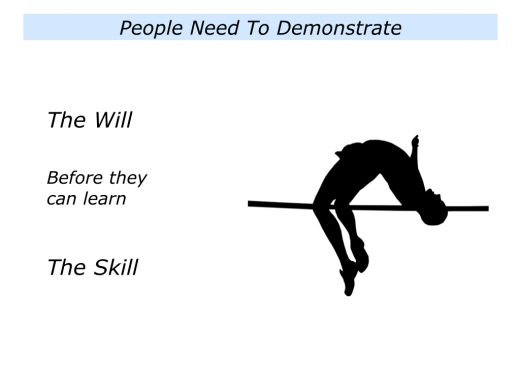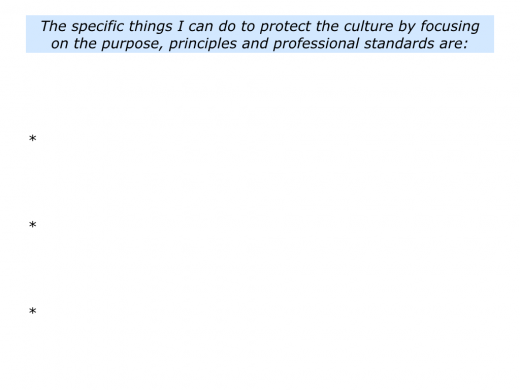
Good leaders get the right balance between being an encourager, educator and enforcer. This sounds tough, but is sometimes necessary.
Such leaders encourage and educate the team members. They are also prepared to enforce the team’s code of conduct.
On a scale 0 – 10, how would you score yourself in each of these three areas?
“I score highly on being an encourager and educator – probably 8/10 on both,” said one leader.
“But I have difficulty with the enforcement part, where I score 6/10. Have you any suggestions?”

Caring leaders are often happy to encourage and educate others, but they may find it hard to deal with people who step over the line.
They don’t want to harangue individuals about details or get into arguments. There is, however, a positive way forward.
Imagine you lead a team and one person continually causes problems. They may be late for meetings, fail to hit deadlines or have poor attention to detail in their chosen field.
One approach is to continually chase them up, but this can be wearing. So let’s explore another approach to being an enforcer.
You can protect the culture by focusing on the
purpose, principles and professional standards
Great teams focus on their purpose, follow certain principles and translate these into professional standards.
People recognise it is important to follow these standards in order to reach the goal. Such teams have self managing people who take responsibility for doing good quality work.
So what can you do if somebody continually fails to deliver the required standards?
Certainly you can act as a policeman and supervise them every day, but that will consume too much time. Let’s look at the alternative approach.
You are the trustee of the team’s purpose and principles. Certainly the trigger for taking action may be that a person has failed to deliver on some element of the standards.
When talking with the person, however, it is vital to return to the team’s compass. So you may wish to say something like:
“Let’s go back to the team’s purpose, principles and professional standards. Are these things that you are prepared to follow?”
Sometimes the person may say: “Yes, but …” They may blame somebody else or want to get into an argument.
If so, simply go back to the original agreements that were made when they joined the team. (Or return to the agreements made when you made clear working contracts with them at some other point.)
Again, you are the custodian of the team’s culture. If the person wants to drag you into the gutter with them, do not start arguing about the past. If appropriate, say:
“Looking to the future, do you want to deliver on the team’s professional standards? It is up to you. It is your choice.”
It is not your job to persuade a person to behave responsibly. It is their job to persuade you. Bearing this in mind, however, it is important that:
You have previously explained the team’s purpose, principles and professional standards. You have also give the reasons for these standards.
You have made clear contracts with people about their best contribution to the team.
You have given them the support they need to do the job. You have asked people to proactively keep you informed of their progress towards their agreed goals.
You have been managing by outcomes – focusing on what people actually deliver – rather than falling into managing by tasks.
Giving Clear Messages To
A Difficult Team Member
If you are asking a difficult team member whether they want to deliver the required professional standards, it is important that:
You have crystal clear data about where they have failed in delivering the professional standards.
Explain the consequences of failing to deliver the standards – both for other people and for themselves.
You can give positive alternatives about how they can behave in the future.
Explain that following the professional standards will produce benefits – both for other people and for themselves.
People need to have a positive goal to head towards, rather than being harangued about the past. So it is vital to offer them a way forwards.
Once you have asked the person if they want to recommit, you can move onto the next step.
Establish whether the person has
the will before focusing on the skill
Great teams have people who demonstrate the right attitude. They aim to be positive, professional and work hard to be peak performers.
So the first step is to establish whether a person has the will to learn something before you try to impart the skill. This can save a lot of time and effort on everybody’s part.
If the person does not have the will to demonstrate the required professional standards, then it is best that they move on.
If the person does demonstrate the will
to deliver the professional standards
You can then, if you wish, work on helping them to learn the skill. If so, make a clear coaching contract. Invite the person to describe:
The specific goals they want to achieve.
The specific things they see as their responsibilities in working towards achieving the goals.
The specific help they want from you as a coach.
The specific things that will be happening that will show they have reached the goals.
If you take the coaching route, then be prepared to commit lots of time. Sometimes the coaching works out; sometimes there are hiccups.
If the coachee does not fulfil their part of the contract, return to the beginning. Establish whether they have the will before spending more time helping them to learn the skill.
You can continue to be a custodian of
the culture around the team’s purpose,
principles and professional standards
“I feel comfortable with being a protector of the culture,” said the leader mentioned earlier in this article.
“That way I am the custodian of the team’s compass and making sure we follow it to achieve concrete results.
“Even though I will be acting as an enforcer, I will be doing so in a positive way.”
Some people find this approach can be liberating. They are doing what they are paid to do. They are protecting the team’s mission, rather than acting as a policeman about details.
Great leaders are good encouragers and educators, but enforcement can be crucial to remind people of the overall compass.
Sometimes it is important to combine all three elements to guide the team to success. If you wish, try tackling the exercise on this theme.
Describe the specific things you can do to protect the culture by focusing on the purpose, principles and professional standards.









Leave a Reply